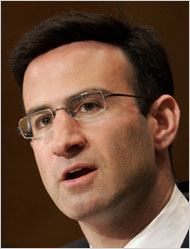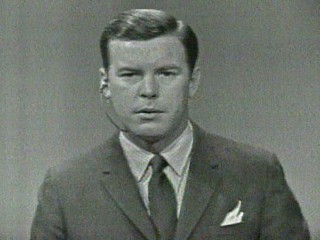
by Diego Del Campo
Women in positions of power in the public sphere is still a relatively new, if slowly progressing sight. It’s become now conventional wisdom that 2008 was a year when women broke barriers in politics. Hillary Clinton was a serious contender to win her party’s nomination, and Sarah Palin became the first woman to be nominated as vice presidential candidate by the Republican Party. Yet, despite this progress, and the fact that Nancy Pelosi became the first female Speaker of the House in 2007, the percentage of female representation in Washington D.C continues to grow at a glacial pace—increasing just 1 percent over 2006, to a total of 17 percent. Washington isn’t the only place where equal representation is at a stalemate.
By the end of 2008, 12 women will have worked as CEOs of Fortune 500 companies. In Hollywood in 2007, women made up only 6 percent of directors and together “comprised 15 percent of all directors, executive producers, producers, writers, cinematographers, and editors working on the top 250 domestic grossing films” (Lauzen 1). Taking all this into consideration it is important to analyze the role the media plays in reinforcing prevalent prejudices against women, important to ask why women is find it difficult to break through to top spots in government and elsewhere, and to what extent do our biases, acquired by us by our socialization (like watching or reading the news), contribute to the problem. In June 2008, after Hillary Clinton lost the nomination, Katie Couric of CBS News made the following statement at the end of one of her shows:
“But like her or not, one of the great lessons of that campaign is the continued and accepted role of sexism in American life, particularly in the media. Many women have made the point that if Senator Obama had to confront the racist equivalent of an ‘Iron my shirt’ poster at campaign rallies or a Hillary nutcracker sold at airports or mainstream pundits saying they instinctively cross their legs at the mention of her name, the outrage would not be a footnote, it would be front page news. It isn’t just Hillary Clinton who needs to learn a lesson from this primary season; it’s all the people who cross the line and all the women and men who let them get away with it.”
Soon after the general election ended, and Barack Obama was elected president, an article published in New York magazine argued that the past election had actually reinforced prevalent gender stereotypes: the proverbial dichotomy of the “bitch” and the “ditz”–a dichotomy arguably codified in the media’s coverage of these two women, is prime example of what Couric described as “acceptable” sexism in the media.
Note and disclosure
There are numerous caveats to my analysis. One, it would be impossible to separate Hillary Clinton’s gender from the fact that she’s one-half of the Clintons, a political family that’s been on the media’s radar for nearly two decades. Similarly, separating Sarah Palin’s gender from the fact that she’s a conservative Republican would be problematic and somewhat of a distortion. Rather, I will try to focus more on the media’s coverage of these two women candidates and how the way they were covered contributes to the problem. Nonetheless, I neither make no insinuation that the media is solely responsible for each woman’s failure to win their respective elections, or that ALL of their media coverage was sexist—but rather a contributing factor. The “media” is a collective term for cable-new channels who generate 24-hour news cycles, to respected newspapers and blogs that bounce narratives off each other. The fact that I only focus on Sarah Palin in the general election isn’t an implication that Barack Obama or John McCain didn’t encounter discrimination because of race or age respectively.
Finally, in the Democratic primaries, I was a supporter of Hillary Clinton.
Part one: Hillary Clinton
“That I am a national figure because I was the first person in 192 years to be at once a congressman, black and a woman proves, I think, that our society is not yet either just or free.” – Shirley Chisholm, first black woman elected to Congress in 1968
From the moment Hillary Clinton announced on her website that she was forming a committee to run for president, her prominent status among the other presidential contenders meant that in the media, she had a target painted on her back. Out of all the candidates that would eventually announce their respective campaigns, among them John Edwards who had been the vice presidential nominee the previous presidential election, Hillary was the one “dubbed” a front-runner based on the national polling the media conducted. The coverage Hillary Clinton received as “front-runner” in the year between making her candidacy official in January 2007 and the Iowa caucus on January 3, 2008 and the one she received once the primaries actually started was different outwardly in tone but nevertheless had the same effect of being dismissive at best, and seriously offensive at worst. In fact, by March 2007, barely two months into the campaign and with the first primary election still some nine months away, the bias in the media had reached a point where the National Organization for Women released an article detailing some of the instances they found offensive. Chris Matthews of MSNBC, who would become a repeat offender to the point of issuing an on-air apology, was a large part of the article:
“Chris Matthews, host of MSNBC’s talk show Hardball, has become notorious for his sexist remarks about Clinton. On Dec. 19, 2006, he charged that she was being coy about her political ambitions, comparing her to ‘a stripteaser saying she’s flattered by the attention,’ and on two separate occasions—Jan. 25 and 26, 2007, he referred to her as an ‘uppity woman.’ In the aftermath of the Congressional election on Nov. 8, 2006, he discussed her delivery of a ‘campaign barn burner speech,’ which, he suggested was ‘harder to give for a woman,’ because it can ‘grate on some men when they listen to it, [like] fingers on a blackboard.’ Not content to level his sexist criticism on Clinton alone, he continued his rant, wondering how newly elected Speaker of the House Nancy Pelosi could ‘do the good fight against the president…without screaming? How does she do it without becoming grating?’ “
Other media narratives that stand out was coverage of Hillary’s appearance—namely a column by the Washington Post that reported on her showing cleavage in a speech she made in the Senate floor. Attention was also paid to Hillary’s laugh, or “cackle” as some of her detractors put it. But it was in the immediate run-up to and aftermath of the Iowa caucus (but before the New Hampshire primary), where Hillary finished in third place that some of the language became more nakedly biased to the point where it became a media frenzy when seemingly teared up when answering a New Hampshire voter’s question. Rebecca Traister of Salon opined “For many of these pundits, especially those who pander to a mostly white male audience, a nearly pornographic investment in Clinton’s demise is nothing new.”
By the time Hillary delivered her concession speech on June 7, 2008, some of the media’s coverage had turned from silly and sexist to borderline violent and misogynistic. Some cartoonists took to drawing Hillary as a slain beast or other variations. Worse, various commentators like NPR’s political editor Ken Rudin and even elected officials like Tennessee congressman Rep. Steve Cohen (D) likened her to the psychotic villain of the film Fatal Attraction. Though both men later issued apologies, the comparison was an especially stinging one since Fatal Attraction is considered by many feminists to be an explicitly anti-feminist film. The media’s tone had been so noxious that the Gloria Steinem-founded Women’s Media Center created a video (above) called “Sexism sells—but we’re not buying it” which compiled some of the highlights of sexism in the media coverage of Hillary Clinton. Steinem also appeared on CNN and echoed what she had said about women candidates at the beginning of the primary in a New York Times op-ed saying, “This country can no longer afford to choose our leaders from a talent pool limited by sex, race, money, powerful fathers and paper degrees. It’s time to take equal pride in breaking all the barriers.”
On CNN she pointed out:
“Clearly part of the problem is the misogyny in the culture at large and especially in the media. I mean, you know, no candidate in history has been asked to step down by the media. She was. The average time that it takes for a loser to endorse a winner in this situation is four months. Four months. She did it in four days, and look how she was criticized, you know, for not doing it the very same night. It’s outrageous.”
Steinem was referencing articles like Jonathan Alter’s of Newsweek, who in late February wrote a column arguing that it would be best for Hillary if she stepped out of the race then. (Hillary went on to win nine out of the next 16 contests.) Steinem also seemed to be referencing the uproar in the media when Hillary didn’t endorse Obama on June 3, the night most media organizations reported that Obama had amassed the amount of delegates needed to secure the nomination.
Part two: Sarah Palin
I say this with all due respect to Hillary Clinton…but when I hear a statement like that coming from a woman candidate with any kind of perceived whine about that excess criticism or you know maybe a sharper microscope put on her, I think you know that doesn’t do us any good—women in politics, women in general wanting to progress this country. -Governor Sarah Palin (R-Alaska) in March 2008
Seemingly out of nowhere, Republican presidential nominee Sen. John McCain picked Alaska Governor Sarah Palin to be his vice presidential nominee. Sarah Palin bursting onto the political scene was arguably a chance for the media to report fairly and accurately on virtually unknown candidate turned vice presidential nominee. Instead, like Steinem argued, sexist narratives seemed to spread virally from within the media. Within days of her announcement, liberal talk show host Ed Schutlz commented to his listeners that Palin had set off a “bimbo alert” and blogs like Daily Kos circulated rumors that Palin’s newborn son Trig, born with Down syndrome, was allegedly her daughter Bristol’s son, while blogs like the Huffington Post took to publicizing images of Palin (under the headline “Former Beauty Queen, Future VP?”) in a swim suit that alluded to her background as a participant in beauty pageants to make the suggestion that she wasn’t qualified to be vice president—a variation of Ed Schultz’s “bimbo alert” crack. Even people who were outwardly supportive of Palin, like CNBC’s Donny Deutsch, were so obssesive over her looks, that they came across as sexist, ignorant, and patronizing all at the same time:
Complicating matters, women organizations who had stood up for Hillary Clinton during the primaries, including Gloria Steinem herself, now for the most part disavowed Palin. The National Organization for Women (NOW) put out a statement that read in part, “Gov. Palin may be the second woman vice-presidential candidate on a major party ticket, but she is not the right woman. Sadly, she is a woman who opposes women’s rights, just like John McCain.” WomenCount was seemingly the only organization to defend Palin against the sexist media treatment Palin was receiving. WomenCount, a politcal organization formed by Hillary Clinton supporters in the waning days primaries to at first to advocate for Hillary Clinton’s candidacy and later to promote and support Democratic women candidates across the country, sent an email to supporters that questioned the media’s immediate criticism of Palin’s nomination, among them John Roberts of CNN who said, “Palin would not be able to focus on her job given her family distractions,” and columnist Sally Quinn of the Washington Post who wrote, “Of course, women can be good mothers and have careers at the same time. I’ve done both. Other women in public office have children…but…a mother’s role is different from a father’s,” which implies that unlike fathers, mothers ought to have more of a responsibility as a parent and by accepting the vice presidential nomination, Palin was being an irresponsible mother by placing her career ahead of her child.
WomenCount’s email statement read in part:
“The question came not just from members of the media but also from voters around the country who wrote in to news organizations and on blogs. The obvious retort is whether anyone would ask the same question of the father of a four-month-old with Down Syndrome and a pregnant teenager. We think not.”
Unlike Gloria Steinem, who would by and large sidestep the issue of the biased media coverage against Palin in a Los Angeles Times op-ed, WomenCount addressed the seeming paradox of progressive feminists standing up for Palin:
“Throughout the weekend, we have been asked about WomenCount’s views on Sarah Palin as the Republican nominee. It is important to distinguish between the broader issue of sexism and the ideology of an individual. WomenCount was born of the passion its founders had for Hillary Clinton’s clear view of social issues and progressive values. We cannot pretend that Governor Palin meets any standard of progressive politics or social values.
But regardless of the candidates’ ideology, we will work to stamp out sexism when we see it on the campaign trail. To paraphrase the words of one blogger who said it best over the weekend: We will defend Sarah Palin against misogynist smears not because we like her or support her, but because that’s how feminism works.”
Needless to say, even though Palin slammed the media in her acceptance speech at the GOP convention in Minneapolis-St. Paul, her subsequent stumbles in the media may have had the effect of silencing any or all allies she may have had across the aisle. Ironically, it was Palin’s interview with Katie Couric, who earlier in the year had criticized sexism in the media, that may have been the most damaging to Palin and her public image. Maybe because of the fact that she had spoken out against sexism in the media, Couric was the right person with the right sensibilities to interview Palin: Couric strayed from the superficial questions that plagued Hillary, like questions about her image or “likability,” instead Couric asked sensible questions like, “When it comes to establishing your worldview, I was curious, what newspapers and magazines did you regularly read before you were tapped for this to stay informed and to understand the world?“ or “What other Supreme Court decisions do you disagree with?”—Arguably easy questions that utterly stumped Palin as shown by her cringe-worthy responses and showed her to be, perhaps not the candidate best suited to be the next vice president. Unfortunately, like New York magazine’s Amanda Fortini said, Palin’s apparent lack of intellectual curiosity reinforced a stereotype as women as a “ditz.” Even in our own class, Palin was dismissed with terms such as “VPILF,” which reduced and belittled Palin to her looks.
The “Palin is a ditz” media narrative continued, unfortunately, all the way from shortly before the election, when news broke that the Republican National Committee had spent $150,000 on Palin’s make-up and wardrobe to after the election was over, when anonymous McCain staffers told the media that in her debate prep against Joe Biden, Palin had allegedly claimed to not know that Africa was a continent and not a country, and also that she reportedly didn’t know the signing members of NAFTA. Geraldine Ferraro, who was the first woman to be nominated for vice president in 1984, appeared on Fox News shortly before the election to talk about the similarities (and differences) between how she was treated and how Palin was being treated by the media:
Said and Done
In the end, I don’t think, like I said before, that the media was the only reason Hillary and Sarah lost in their elections. But, as some of the clips show, there is an accepted and pervasive bias against women that slows the progress of women everywhere. Even today, I’m still not sure why Sarah Palin’s preparedness was questioned from day one on the basis that she had barely served two years in her term as governor, in way that Barack Obama’s preparedness arguably wasn’t questioned when he announced his candidacy, since at that time he had also barely served two years in his term as senator. As it turned out, there was a mountain of difference between Obama and Palin’s preparedness, as shown by their respective bodies of knowledge, but still, I would have liked for the media to have made more of an issue of Obama’s experience, if indeed experience was a litmus test of sorts against which Palin did not measure up.
I would also hope that in the future, women candidates are respected more and held to the same standard that every other candidate is—a woman shouldn’t have to sound tougher just because she’s a woman. Additionally, we shouldn’t be too dismissive of women who point out the problems the media sometimes has in reporting about women. As the clip above shows, an observation Katie Couric made both in her CBS newscast and in her acceptance of an award at a journalist’s association, earned her the top spot on Keith Olbermann’s “Worst Persons in the World.” It troubles me that even within the ideological circles we sometimes wrap ourselves in, there’s still an outward prejudice against women—Olbermann’s show is praised by liberal blogs like Daily Kos, where he is a contributor, and Huffington Post. Even with all the progress Hillary Clinton and Sarah Palin have made toward the acceptance in the public sphere of a woman running for the top positions in government, that “highest and hardest glass ceiling” remainsl unbroken. As we continue to progress, hopefully we’ll have learned lessons from what each woman’s campaign and not allow sexism to control–in any way–media coverage of other women candidates.




 Only a month ago, Obama was elected to be the next President of the U.S. and there are still more than two months before he gets officially gets sworn in. Yet, there are pundits and ideologues from the Left and the Right who are already complaining about Obama, in terms of his government appointees and overall handling of the transition.
Only a month ago, Obama was elected to be the next President of the U.S. and there are still more than two months before he gets officially gets sworn in. Yet, there are pundits and ideologues from the Left and the Right who are already complaining about Obama, in terms of his government appointees and overall handling of the transition.







